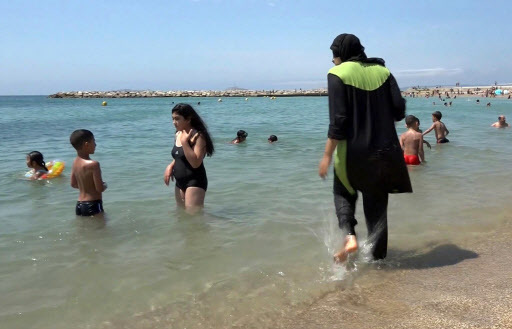LONDON (AFP) - The ban on the Islamic burkini swimsuit on some French beaches has triggered disdain in English-speaking countries, where outlawing religion-oriented clothing is seen as hampering integration.
Newspaper commentators have condemned the ban as an absurdity, and one questioned how a burkini could be more offensive than “middle-aged bum crack” bursting out from traditional Western beachwear.
And experts said the debate raised questions about the French one-size-fits-all model of integration.
In Britain, the full-face veil is not an uncommon sight in towns and city districts with big Muslim populations, but ostensibly does not stir as strong a reaction as in France.
One of the world's most secular countries, France strongly separates religion and public life.
Defenders of the policy say a common arena without religious connotations helps avoid sectarian conflicts and encourages equality.
As a result, the burkini -- like the burqa before it -- has come under fire in France. Some deem it a garment that channels radical Islam and oppresses women.
“It is the expression of a political project, a counter-society, based notably on the enslavement of women,” French Prime Minister Manuel Valls said of the burkini Wednesday.
Such views are widely contested in Britain, both on the grounds of tolerance and practicality.
Britain’s best-known example of burkini-wearing was not by a Muslim but by TV chef Nigella Lawson, who hit the headlines in 2011 when she wore a black version of it on Bondi Beach in Sydney.
‘Wetsuit demonization’
A BBC look at the issue found women in Britain speaking in favor of the burkini and saying it aided integration.
“The burkini allows me the freedom to swim and go on the beach, and I don't feel I am compromising my beliefs for that,” Aysha Ziauddin told the broadcaster.
Maryam Ouiles said: “It’s outrageous that you would effectively be asked to uncover some flesh or leave.
”People are always complaining that Muslims should integrate more, but when we join you for a swim that‘s not right either."
Commentator David Aaronovitch, writing in The Times newspaper, said only "warped minds" would impose a burkini ban.
 |
In this Aug. 4 2016 file photo made from video, Nissrine Samali, 20, gets into the sea wearing a burkini, a wetsuit-like garment that also covers the head, in Marseille, southern France, on Aug. 4. (AP-Yonhap) |
"The idea that full-length clothing provokes attacks on the wearer, as the French suggest, displays a poisonous logic," he said.
No problems are solved by this "French absurdity," only new ones created, he wrote.
Remona Aly, the communications director for the Exploring Islam Foundation, produced a list of "five reasons to wear a burkini -- and not just to annoy the French."
"Nothing says 'losing the plot' to me more than demonizing what is, let’s face it, a wetsuit," she wrote in The Guardian newspaper.
"Is full-piece swimwear really more offensive than seeing a middle-aged bum crack?"
Assimilation vs. multiculturalism
Sara Silvestri, who specializes in religion and politics at City University London, said France's approach to integration was one of assimilation, whereas Britain had encouraged multiculturalism.
Neither country could claim success, she said.
"Both models of integration are in crisis: they are no longer applied or understood in a clear-cut manner, and both countries are looking at each other to learn lessons and potentially modify the way in which they deal with minorities," she told AFP.
Patrick Simon, an international migration and minorities expert at the French Institute for Demographic Studies, said the burkini debate was driving the impression that minorities, rather than the structure of French society, were the problem.
"There is a difficulty in the French integration model in accepting cultural and religious practices in the public domain," he told AFP.
Recent terror attacks bolstered the notion that diversity could threaten national cohesion, he said.
"The state discourse has gone from one of tolerance to one of exclusion regarding one section of society."
In the United States, the ban was being seen as illogical -- imposing rules to stop women having to obey rules.
The ban is about more than religion or clothing, Amanda Taub wrote in The New York Times newspaper.
It is about "protecting France’s non-Muslim majority from having to confront a changing world."
The burkini was invented about a decade ago by Australian designer Aheda Zanetti, who spotted a gap in the market for Islamic sportswear.
Zanetti told AFP she was frustrated that the word now had negative connotations.
French politicians "symbolize it as an Islamic term in a bad way when it's really just a word," she said.








